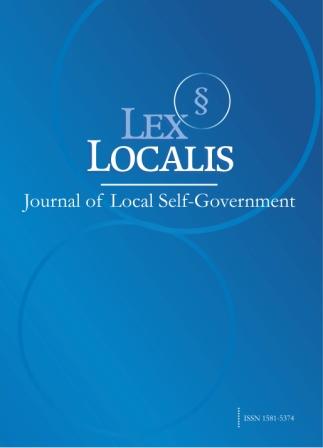The Impact of Sustainable Development and Spatial Rationality Planning of Urban Buildings Under the Guidance of Local Government Policies: Environmental Policy and Green Building Design Principles
DOI:
https://doi.org/10.52152/22.1.197-216(2024)Keywords:
local government environmental policy, sustainable development of urban buildings, spatial rationality planning, green building, design principlesAbstract
In order to explore the relationship between the sustainable development of urban buildings and spatial rationality planning under the guidance of local government policies, this paper takes Beijing, Shanghai, and other regions as examples to conduct a questionnaire survey literature, analyzes environmental policies and green building principles, and puts forward several hypotheses based on relevant literature. Spatial rationality planning has an impact on the sustainable development of cities. Environmental policies and green building design principles have a constraining effect on the sustainable development of cities. Government policies can ensure the sustainability of urban building development and promote the rational distribution of space. The results show that there is an inevitable relationship between the rational spatial layout and the sustainable development of urban buildings, and environmental policy and green building design principles can promote the rational planning of space. Government policies can guide the rational layout of space and improve the sustainable development of cities. Therefore, spatial rationality planning is the main factor for the sustainable development of the city, government policy is the external factor, and environmental policy and green building design are the constraints. From the perspective of environmental policies and green building principles, local governments should guide spatial rationality planning to improve the sustainable development of buildings.
References
Abdelzaher, M.A., Farahat, E.M., Abdel-Ghafar, H.M., Balboul, B.A.A. & Awad, M.M. (2023) Environmental Policy to Develop a Conceptual Design for the Water-Energy-Food Nexus: A Case Study in Wadi-Dara on the Red Sea Coast, Egypt, Water, 15(4), p. 56.
Ahmad, M. & Satrovic, E. (2023) How does monetary policy moderate the influence of economic complexity and technological innovation on environmental sustainability? The role of green central banking, International Journal of Finance & Economics,2(2), p. 23.
An, J., Jung, D., Jeong, K., Ji, C., Hong, T., Lee, J., Kapp, S. & Choi, J. (2023) Energy-environmental-economic assessment of green retrofit policy to achieve 2050 carbon-neutrality in South Korea: Focused on residential buildings, Energy and Buildings, 289(2), p. 32.
Hofmann, B. (2023) Persuasive innovators for environmental policy: green business influence through technology-based arguing, Environmental Politics,23(3), p. 98.
Jakucionyte-Skodiene, M. & Liobikiene, G. (2023) Changes in energy consumption and CO2 emissions in the Lithuanian household sector caused by environmental awareness and climate change policy, Energy Policy, 180(2), p. 102.
Jiang, W. & Yuan, M. (2022) Coordination of Prefabricated Construction Supply Chain under Cap-and-Trade Policy Considering Consumer Environmental Awareness. Sustainability, 14(9), p. 77.
Lappe-Osthege, T. (2023) The Ripple Effects of Compliance: Reconfiguring EU Policy Effectiveness in Transboundary Environmental Governance, Jcms-Journal of Common Market Studies,23(2), p. 89.
Leiringer, R., Gottlieb, S.C., Fang, Y. & Mo, XY (2022) In search of sustainable construction: the role of building environmental assessment methods as policies enforcing green building, Construction Management and Economics, 40(2), pp. 104–122.
Liu, X. & Kang, Z.Y. (2022) Environmental Policy and Exports in China: An Analysis Based on the Top 10,000 Energy-Consuming Enterprises Program, Sustainability, 14(21), p. 98.
Mbassi, C.M., Hyoba, S.E.C. & Shahbaz, M. (2023) Does monetary policy really matter for environmental protection? The case of inflation targeting, Research in Economics, 77(3), pp. 427–452.
Wang, J.L., Li, Z.H., Ye, H.K., Mei, Y.D., Fu, J.X. & Li, Q. (2021) Do China's coal-to-gas policies improve regional environmental quality? A case of Beijing, Environmental Science and Pollution Research, 28(41), pp. 57667–57685.
Wei, X.H., Jiang, F. & Yang, L.S. (2023) Does digital dividend matter in China's green low-carbon development: Environmental impact assessment of the big data comprehensive pilot zones policy, Environmental Impact Assessment Review, 101, pp. 107–143.
Xie, P.J., Xu, Y., Tan, X. & Tan, Q.Q. (2023) How does environmental policy stringency influence green innovation for environmental managements?, Journal of Environmental Management, 338(3), p. 17.
Yang, Z., Chen, H., Mi, L., Li, PP & Qi, K. (2021) Green building technologies adoption process in China: How environmental policies are reshaping the decision-making among alliance-based construction enterprises?, Sustainable Cities and Society, 73(2), p. 69.
Yi, S.L. & Zou, C.Y. (2023) Assessing Transformation Practices in China under Energy and Environmental Policy Goals: A Green Design Perspective, Sustainability, 15(4), p.78.
Zhai, T. (2021) Environmental Challenges, Opportunities, and Policy Implications to Materialize China's Green Belt and Road Initiative, Sustainability, 13(18), p. 89.
Downloads
Published
Issue
Section
License
Copyright (c) 2024 Lex localis - Journal of Local Self-Government

This work is licensed under a Creative Commons Attribution-NonCommercial-NoDerivatives 4.0 International License.








